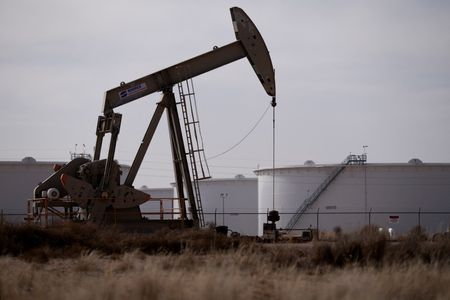By Enes Tunagur
LONDON (Reuters) -Oil prices fell slightly on Wednesday as an industry report showed higher crude inventories in the United States, reinforcing concerns about oversupply, though price declines were limited by a tighter fuel market because of attacks against Russian oil infrastructure.
Brent crude futures eased 44 cents, or 0.68%, to $64.45 a barrel by 0923 GMT, after gaining 1.1% in the previous session.
U.S. West Texas Intermediate crude futures were down 46 cents, or 0.76%, at $60.28 a barrel, after rising 1.4% on Tuesday.
Prices rose on Tuesday because of a tighter diesel market on the back of lower Russian exports, PVM analyst John Evans said.
U.S. crude stocks rose by 4.45 million barrels in the week ended November 14, while gasoline inventories climbed by 1.55 million barrels and distillate inventories increased by 577,000 barrels, market sources said late on Tuesday, citing American Petroleum Institute figures.
“Overall, the report was relatively bearish,” said ING commodities strategists, though they cautioned: “Market participants appear more concerned about supply risks than the odds of a surplus going forward.”
U.S. sanctions on major Russian producers Rosneft and Lukoil set a November 21 deadline for companies to unwind their dealings with the Russian firms.
On Monday the U.S. Treasury said the sanctions, already squeezing Russia’s oil revenue, are expected to curb its export volumes. Crude buyers in China and India have already started switching to alternative suppliers.
Concerns about Russian supply are being weighed against analysts’ forecasts that oil output is in excess of current demand, which has put pressure on prices.
After Ukrainian attacks on Russian energy and port infrastructure, profit margins on diesel fuel surged in Europe, reaching their highest on Tuesday since September 2023, amid an increase in refinery margins globally.
Official U.S. government inventory data will be released later on Wednesday. Eight analysts polled by Reuters ahead of the release estimated that crude inventories were likely to have fallen by an average of about 600,000 barrels in the week to November 14.
(Reporting by Jeslyn Lerh; Additional reporting by Sam Li and Lewis Jackson in Beijing; Editing by Peter Graff, Christian Schmollinger, Clarence Fernandez)










